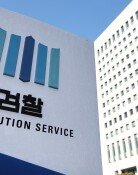[Opinion] Credit Card Politicians
[Opinion] Credit Card Politicians
Posted November. 25, 2006 08:10,
Lee Ik, who is well-known under the pen name of Seong-ho, was a practical realist scholar in the Joseon Dynasty. He said, If something is tilted, it can be corrected anyway and if upturned, it can be turned over again. Yet, once something goes extinct, theres no way to revive it.
In the wake of the Pyongyangs nuclear tests in October, the Korean society appears to have landed on its feet again, but some remains strongly skeptical; cynics doubt whether South Korea will overcome the obstacles of home and abroad. Although progress in this divided Korean peninsular is hard to achieve even in a cooperative way, we find ourselves abhorring each other and the popular unrest. It is just a right condition where populism burgeons, threatening the nerves of the state.
Latin American countries in which populism has been well observed are said to show signs of departing from their populist politics. Some say that as more people purchase their own houses and start to use credit cards, the more people turn their backs against populist politicians. Credit cards as a means of payment rely on the future income to purchase goods in the present moment. Since credit card holders have to secure their future income to pay the bills, they are inclined to prefer long-term health of the economy to the myopic economic policies for the present. It can be said that using credit cards grants an opportunity to correct the shimmering political illusion to its users.
The older generations of those over 40 years old in Korea have grown up in poverty. They know what it is to be poor, and they know how to bear the poverty. If the economic downturn continues to aggravate, unfortunately, who suffers the most from the recession are the younger generations of Korea. Abrupt falls in the standard of living would be a disaster for them. In this regard, we should learn a lesson from Latin American countries, because their anti-populism sentiment comes from their bitter experiences in the past which are similar to ours.
Gwanjung, who is well known for the saying of the Gwanpojigyo-Damon and Pythias friendship, wrote in his book, No man knows manners before his granary is replete with crops, and no man understands the vicissitude of life before food and clothes are bountiful for his living. After all, manner and disgrace come second to the economy, and no state stands firm without a thriving economy. Jeong Do-jeon, a politician in the early Joseon Dynasty, had an insight to say that politics can be defined to feed the nation. The economic policy failure of the Roh administration is primarily accountable for todays social and political turmoil in Korea. Additionally, the Korean citizens need to tell of the good and bad policies and politicians. We should have learned a lesson without being put through the mill, but it is already too late to avoid the pain.
Hong Chan-sik, Editorial writer, chansik@donga.com



![“한동훈, 정치생명 걸고 무소속 출마해 평가받는 것 고려할만”[정치를 부탁해]](https://dimg.donga.com/c/138/175/90/1/wps/NEWS/IMAGE/2026/01/19/133186982.1.jpg)


![[한규섭 칼럼]왜 여당 지지율은 떨어지지 않는가](https://dimg.donga.com/c/138/175/90/1/wps/NEWS/IMAGE/2026/01/19/133189257.1.png)
